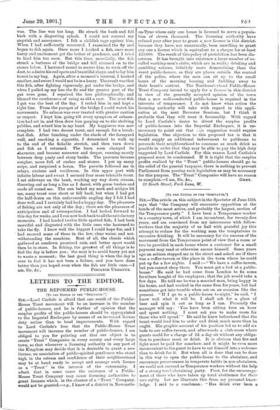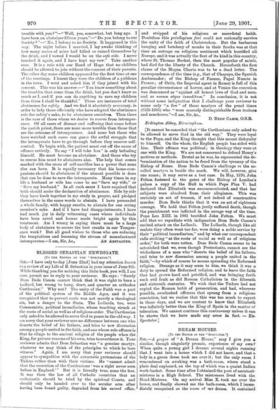(TO THE EDITOR 07 THE -spiv:Irma.") Sru,—The article on this
subject in the Spectator of June loth says that "the Company will encounter opposition at the hands of the most active, and probably the largest, section of the Temperance party." I have been a Temperance worker in a country town, of which I am incumbent, for twenty:five years, and am convinced from my intercourse with fellow- workers that the majority of us hail with grateful joy this attempt to reduce for the working man the temptations to excessive drinking. It will be necessary for the success of the movement from the Temperance point of view that a room or two be provided in each house where a customer for a small payment may read or otherwise amuse himself. Some years ago an artisan stopped me in the street and asked me if there was a coffee-tavern or like place in the town where he could put up for a few nights. I said :—" We have a coffee-tavern, but you cannot sleep there. You must get a bed at a public. house." He said he had come from London to fix some furniture bought of his employers ; that the job would take a few days. He told me he was a married man, being happy in his home, and had worked in the same firm for years, but had sometimes got into trouble when out on an occasion like the present. "If I go to a public-house to-night," he said, "I know well what it will be. I shall ask for a glass of beer and spin it out as long as I can. Presently the manager will say : 'You have been sitting here an hour and spent nothing. I must ask you to make room for those who will spend.' " He said he knew beforehand that the taunt would lead him to order and drink much more than he ought. His graphic account of his position led us to add six beds to our coffee-tavern, and afterwards a club-room where guests could for a charge of 2d. a day sit without any obliga- tion to purchase meat or drink. It is obvious that fire and light must be paid for somehow, and it might be even more inconvenient to the guest to have to eat himself into a welcome than to drink for it. But when all is done that can be done in this way to open the public-house to the abstainer, and encourage perseverance in temperate habits in non-abstainers, we could not succeed as Temperance workers without the help of a strong total-abstaining party. First, for the encourage- ment of those who have taken up total abstinence for their own safety. Let me illustrate this from my personal know- ledge. I said to a coachman : "Has drink ever been a trouble with you ?"—" Well, yes, somewhat, but long ago. I have been an abstainer fifteen years."—" Do you belong to our Society?"—" No, I belong to no Society. It happened in this way. The night before I married, I lay awake thinking of bow many mates of mine had killed or ruined themselves by the drink, and I vowed I would be on the safe side. I never touched it again, and I have kept my vow." Take another case. It is a rule with our Band of Hope that no children should be allowed to join without the consent of their parents. The other day some children appeared for the first time at one of the meetings. I learnt they were the children of a publican in the town. I went and asked him if they joined with his consent. This was his answer :—" You know something about the troubles that come from the drink, but you don't know as much as I, and if you can do anything to save my children from them I shall be thankful." These are instances of total abstinence for safety. And we find it absolutely necessary, in order to help those efficiently who have adopted the abstinence rule for safety's sake, to be abstainers ourselves. Then there is the case of those whom we desire to rescue from intemper- ance. Of all cases of disease and suffering that come before the parish priest, there are none more terrible than those that are the outcome of intemperance. And none but those who have watched such cases can guess the awful struggle that the intemperate have to go through before they recover self- control. To begin with, the patient must cut off the cause of offence entirely. To say "I will take less" is only befooling himself. He must become an abstainer. And those who try to rescue him must be abstainers also. The help that comes marked with the cross of self-sacrifice has a power that none else can have. It is equally necessary that his home-com- panions should be abstainers if the utmost possible is done that can be done to save the intemperate. Many times in my life a husband or wife has come to me "Save my wife," or Save my husband." In all such Gases I have required that both should make the declaration of abstinence. Side by side they have knelt together in my study in prayer, and pledged themselves in the same words to abstain. I have persuaded a whole family, with happy results, to abstain for one erring member's sake. And if I have had disappointments, I have had much joy in daily witnessing cases where individuals have been saved and homes made bright again by this treatment. Am I wrong in saying there must be a large body of abstainers to secure the best results in our Temper- ance work But all good wishes to those who are reducing the temptations and lessening the stream of manufactured intemperates.—I am, Sir, &c., An ABSTAINER.





















































 Previous page
Previous page